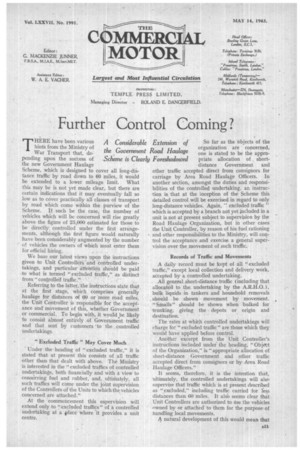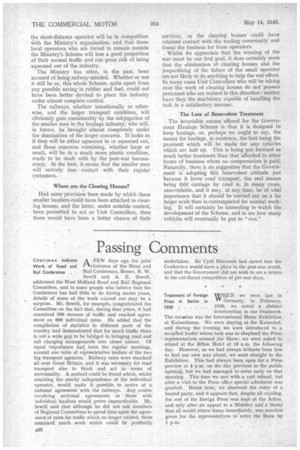Further Control Coming?
Page 13

Page 14

If you've noticed an error in this article please click here to report it so we can fix it.
THERE have been various hints from the Ministry of War Transport that, depending upon the success of the new Government Haulage Scheme, which is designed to cover all long-distance traffic by road down to 60 miles, it would be extended to a lower mileage limit. What this may be is not yet made clear, but there are certain indications that it may eventually fall so low as to cever practically all classes of transport by road which come within the purview of the Scheme. If such be the case, the number of vehicles which will be concerned will rise greatly above the figure of 25,000 estimated for those to be directly controlled under the first arrangements, although the first figure would naturally have been considerably augmented by the number of vehicles the owners of which must enter them for ,official hiring.
We base our latest views upon the instructions given to Unit Controllers, -and Controlled undertakings, and particular attention should be paid to what is termed "excluded traffic," as distinct from "controlled traffic."
Referring to the latter, the instructions state that at the first stage, which comprises generally haulage for distances of 60 or more road miles, the Unit Controller is responsible for the acceptance and movement of this, whether Government or commercial. To begin with, it would be likely to consist almost entirely of Government traffic and that sent by customers 'to the controlled undertakings.
"Excluded Traffic" May Cover Much Under the heading of "excluded traffic," it is stated that at present this consists of all traffic other than that dealt with above. The Ministry is interested in the "excluded traffics of controlled undertakings, both financially and with a view to conserving fuel and rubber, and, ultirhately, all such traffics will come under the joint supervision of the Controllers of the Units to which the, vehicles concerned are attached."
At the commencement this supervision will extend only to "excluded traffics" of a controlled undertaking at a place where it provides a unit centre. So far as the objects of the organization are concerned, one is stated to be the appropriate allocation of shortdistance Government and other traffic accepted direct from consignors for carriage by Area Road Haulage Officers. In another section, amongst the duties and responsibilities of the controlled undertaking, an instruction is that at the inception of the Scheme this detailed control will be exercised in regard to only long-distance vehicles. Again, " excluded traffic" which is accepted by a branch not yet included in a unit is not at present subject to supervision by the Road Haulage Organization, but in other cases the Unit Controller, by reason of his fuel rationing and other responsibilities to the Ministry, will control the acceptance and exercise a general supervision over the movement of such traffic.
Records of Traffic and Movements A daily record must be 'kept of all "excluded traffic," except local collection and delivery work, accepted by a controlled undertaking. All geriepal short-distance traffic (including that allocated to the. undertaking by the A.R.H.0.), bulk liquids in tankers and household removals should be shown movement by movement. "Smalls" should be shown when bulked for trunking, giving the depots or origin and destination.
The rates at which controlled undertakings will charge for "excluded traffic" are those which they would have applied before control.
Another excerpt from the Unit Controller's instructions included under the heading, "Object of the Organization," is "appropriate allocation of short-distance Government and other traffic accepted direct from consignors or by -Area Road Haulage Officers."
It seems, therefore, it is the intention that, ultimately, the controlled undertakings will also supervise that traffic which is at present described as "excluded," including traffic carried for less distances than 60 miles. It alsb seems clear that Unit Controllers are anthorized to Use the vehicles owned by or attached • to them for the purposeof handling local movements. 4 natural development of this would mean that the short-distance operator will be in competition 4.rith the Ministry's organization, and that those local operators who are forced to remain outside the Ministry's Scheme will lose a good proportion of their normal traffic and run great risk of being squeezed out of the industry.
The Ministry has often, in the past, been accused of being railway-minded. Whether or not it still be so, this whole Scheme, quite apart from any possible saving in rubber and fuel,, could not have been better devised to place the industry under almost complete control.
The railways, whether intentionally, or other, wise, and the larger transport combines, will oliviOusly gain considerably by the subjugation of the smaller men in the haulage industry,' who will, in future, be brought almost completely under the domination of the larger concerns. It looks as if they will be either squeezed in or squeezed out, and those concerns remaining, whether large or small, will be in a much more plastic condition, ready to be dealt with by the post-war bureaucracy. At the best, it-seems that the smaller men will entirely lose contact with their regular customers.
Where are the Clearing Houses?
Had some provision been made by which these smaller hauliers could have been attached to clearing houses, and the latter, under suitable control, been permitted to act as Unit Controllers, then there would have been a better chance of their survival, as the clearing houses could have retained contact with the trading community and found the business for these operators.
Whilst ire appreciate that the winning of the war must be our first goal, it does certainly seem that the elimination of clearing houses and the jeopardizing of the future of the small operator ,are not likely to do anything to help the war effort. In many cases Unit Controllers who will be taking over the work of clearing houses do not possess personnel who are trained in this direction; neither have they the machinery capable of handling the task in a satisfactory manner.
The Lure of Benevolent Treatment The invariable excuse offered for the Government Haulage Sdherne is that it is designed to keep haulage, or, perhaps we ought to say, the means for haulage, in existence, the bait being the paymerit which will be made for any vehicles which are laid up. This is being put forward as much better treatment than that afforded to other forms of business where no compensation is paid. Naturally, there is no suggestion that the Government is adopting this benevolent attitude just because it loves road transport, the real reason being that earriage by toad is, in many cases, unavoidable, and it may. at any time, be of vital importance that it should be carried out on a far larger scale than is contemplated for normal work ing. It will certainly be interesting to watch the development of the Scheme, and to see how many vehicles will eventually be put to "rest."




















































